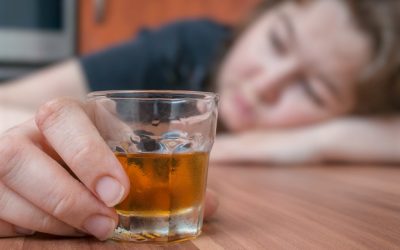If you reach for alcohol in an effort to avoid experiencing a panic attack or feelings of anxiety, you can quickly become trapped in a debilitating cycle that becomes very difficult to break. When you drink alcohol your brain releases a burst of serotonin that can make you feel euphoric and confident, only to crash when you stop drinking and your serotonin levels are lowered dramatically. Drinking alcohol causes a number of immediate effects in your body – your heart rate may increase, your blood sugar drops and you may eventually become dehydrated.
- Support for the role of genetic factors as a cause for the co-presence of these disorders indirectly has been provided by family and twin studies (e.g., Merikangas et al. 1994, 1996; Tambs et al. 1997).
- The connection between alcohol and anxiety creates a vicious circle for its users.
- It slows down processes in your brain and central nervous system, and can initially make you feel less inhibited.10,11 In the short-term, you might feel more relaxed – but these effects wear off quickly.
- Your body can have an uncomfortable sensation the next day as a result, which can feel like a nervous energy or anxiety.
To borrow terminology from the respective CBT approaches for anxiety and AUDs, the link between anxiety and drinking for comorbid clients may mean that in effect an exposure exercise also becomes a high-risk situation for alcohol relapse. Relapse to avoidance strategies (e.g., reliance on checking behaviors in obsessive-compulsive disorder or avoidance of social gatherings in social anxiety disorder) in the process of exposure is undesirable even for people suffering only from an anxiety disorder. For people who use alcohol as an avoidance strategy, however, a relapse can be especially costly. Moreover, use of alcohol to avoid anxiety during an exposure exercise also can interfere with the corrective learning process required for extinction of the anxiety response. Indeed, research findings suggest that exposure-based methods can lead to worse alcohol outcomes for comorbid individuals and that alcohol use during exposure may hinder extinction (e.g., ,Randall et al. 2001).
Symptoms
But, if you drink a lot you can reduce your levels of GABA, causing an increase in anxiety. According to a review study that looked at anxiety and alcohol use disorders, this relationship can become a dangerous, self-perpetuating cycle. We have the experience and resources needed to match you with a detoxification programme that suits your budget and lifestyle – give our friendly team a call today and take your first step towards breaking the vicious cycle of alcohol and panic attacks.
- Even if someone starts drinking alcohol as a way to cope with anxiety, it can quickly have the opposite effect.
- Read our review of the best online therapy options to find the right fit for you.
- This review of literature from multiple disciplines required sacrificing depth for breadth.
- Studies have shown a different trend of alcohol use in people who are diagnosed with generalized anxiety disorder or panic disorder.
- These models include the tension reduction hypothesis (17) and the self-medication hypothesis (18), and they can be particularly relevant in cases of AnxD that normally precede the emergence of dependency, such as general AnxD and agoraphobia (17–19).
Together, these results suggest that women may be more likely to rely on alcohol to manage anxiety. If you suspect that you have an alcohol use problem, effective treatments are available. Talk to your doctor about medications, therapy, and support groups that can help you manage your alcohol consumption. It could also be that alcohol use provides a mechanism for these disorders to develop. This article explores the reasons people use alcohol to cope with anxiety and the effect it may have. It also discusses how to recognize when you have an alcohol problem and how to get treatment for anxiety and alcohol use disorders.
How we reviewed this article:
Similar to the common-factor and self-medication hypotheses, the literature underpinning the substance-induced pathway to comorbid anxiety and AUDs is convincing but cannot account for the findings consistent with the other causal models. It also is important to note that reliance on timeframes, although useful, could mask an independent course of anxiety symptoms among individuals who also have an AUD. For example, it is possible that an anxiety disorder which appears at a time when the person is experiencing alcohol-related problems may have an etiology separate from alcohol use. Likewise, a reduction in anxiety symptoms following alcohol treatment, which often is interpreted as an indication that the anxiety symptoms were a consequence of alcohol use, could also be explained by anxiolytic therapy and/or the natural course of anxiety independent of any effects related to abstinence.
Here, I’ll explore why alcohol can cause feelings of panic, and what you can do to reduce your risk of this happening. Selective serotonin reuptake inhibitors are the first choice drugs in non-comorbid anxiety and AUD treatments (1, 15, 102). There seems to be quite a large amount of data on the effectiveness of the SSRIs; however, there have been few rigorous studies, reflected in the very low quality of evidence that the results provide (1).
‘Unwinding’ with alcohol
The greater the amounts of alcohol consumed and the more regular the intake, the more likely a person will be to develop temporary anxiety and depressive symptoms. As consumption increases even more, these symptoms also are likely to intensify. Its pharmacological treatment is still poorly addressed, with only about 30% of the patients achieving full recovery. It has been proven many people with this condition turn to drinking as a method of self-medication. As a consequence, those affected by social anxiety and alcohol consumption then have to drink more to deal with the new alcohol side effects.
Certain theories give rise to the expectation that alcoholics might have high rates of long-term, independent anxiety and depressive disorders (Wilson 1988). Perhaps as a result of the influence of these theories, psychotherapists frequently reported deep-seated emotional difficulties or persisting psychiatric symptoms in alcoholics, even when alcohol-dependent people were sober. However, there is also clinical does alcohol cause panic attacks evidence that alcohol use, in addition to its initial anxiolytic effects, causes long-term increase in anxiety and agoraphobia.15,20 A few clinical studies have also reported that alcoholism began before PD. In the Breier et al.6 study, 80% of patients (8 of 10) had alcoholism before their first panic attack. The clinical study by Goldenberg et al.21 failed to support the self-medication hypothesis.
About our health information
Even if someone starts drinking alcohol as a way to cope with anxiety, it can quickly have the opposite effect. For one, drinking alcohol more frequently or having larger amounts can cause hangovers. Long-term alcohol use also often leads to tolerance, when a person needs to drink more to get the desired effect.
- Speaking with friends and family can help them prepare to support you when a panic attack strikes.
- Knowing how alcohol affects anxiety may make it less tempting to have a drink to cope.
- Society would have us believe that there’s no better way to unwind after a long day than by drinking a glass of wine, cold beer, or sipping your go-to liquor.
- When a person has more than one mental health disorder —such as an anxiety disorder and an alcohol use disorder—it is referred to as a dual diagnosis or co-occurring disorders.
- According to the National Institute on Drug Abuse (NIDA), the term “comorbidity” describes two or more disorders or illnesses occurring in the same person.
Some authors (58, 59) have found that quetiapine may be a promising agent for non-comorbid GAD, whereas more studies are needed before making practical recommendations on the use of olanzapine and risperidone. Risperidone and olanzapine add-on could play a role in resistant or chronic posttraumatic stress disorder patients, although only the addition of risperidone can be recommended on the basis of the criterion of two or more positive placebo-controlled trials (60). Scientific institutions and associations web pages consulted for clinical guidelines on treatment of comorbid AnxD–alcohol-use disorders patients.
If you find a connection between drinking alcohol and feeling anxious you can take steps to reduce the amount you drink. But if you still notice anxiety or panic symptoms with this level of drinking, you could try to further reduce how much you drink. You could start by keeping a symptom diary so you can see any links between when you drink, and any anxiety or panic attacks which occur later on.



